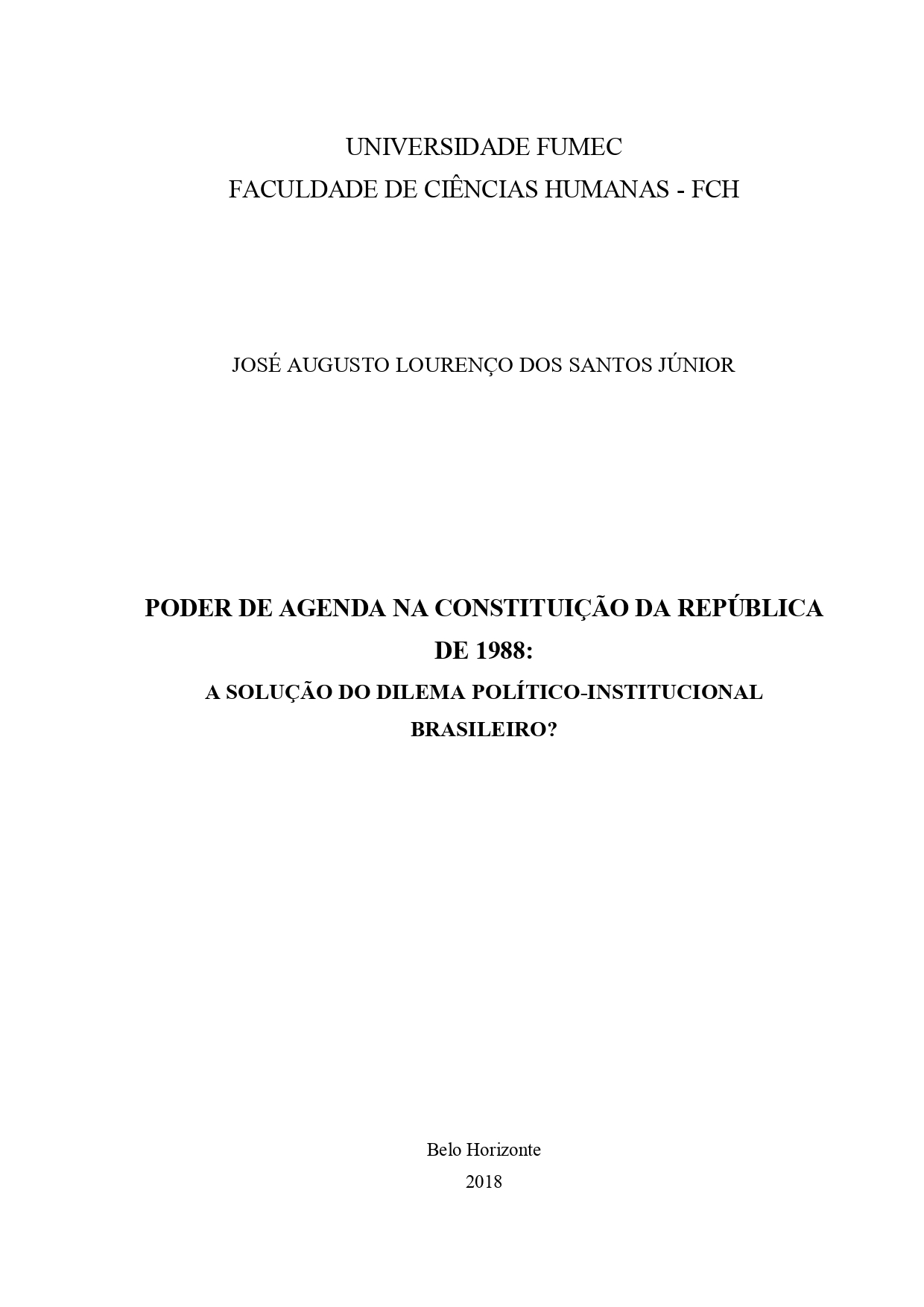Poder de agenda na Constituição da República de 1988: a solução do dilema político-institucional brasileiro?

Visualizar/Abrir
Data
2018Autor
Santos Júnior, José Augusto Lourenço dos
xmlui.mirage2.itemSummaryView.MetaData
Mostrar registro completoResumo
O objetivo é estudar como o Poder Político brasileiro se organiza, em âmbito federal,
para conduzir os assuntos estratégicos do país, com ênfase na relação entre os Poderes
Executivo e Legislativo.
Com isso no horizonte, foi feita uma discussão da criação da Teoria da Separação de
Poderes, abarcando séculos de história, trazendo a lume pensadores como Aristóteles,
Montesquieu, Hobbes, Locke e “Os Federalistas”, para explicitar como surgiu e se desenvolveu
aludida doutrina até os dias de hoje. Nesse contexto, foi feito uma comparação entre as relações
entre o Executivo e o Legislativo no Presidencialismo e no Parlamentarismo.
À frente, explicou-se como funciona o sistema eleitoral no Brasil, que combina
presidencialismo com voto proporcional e lista aberta, características vistas com pessimismo
pela doutrina especializada quando combinadas, pois dificultariam a governabilidade ou a
tornariam muito custosa.
Por fim, estudou-se o ponto principal da pesquisa, que é o Presidencialismo de
Coalizão e seus efeitos na política brasileira. A intenção da pesquisa foi prover uma explicação
detalhada acerca da relação entre Presidente da República e Legislativo. Apesar de todas as
expectativas negativas dos analistas sobre a governabilidade e a estabilidade do sistema político
criado durante a elaboração da Constituição da República de 1988, a prática demonstrou que o
Presidente consegue governar, formando uma coalizão de apoio e tendo altos níveis de sucesso
e dominância no que se refere ao Congresso Nacional.
A hipótese aventada para o sucesso de aludido sistema parte do princípio de que o
Presidente somente consegue impor seu programa de governo porque a Constituição da
República o municiou com diversos poderes legislativos, os quais, bem utilizados, direcionam
os trabalhos do Legislativo, facilitando a obtenção de apoio parlamentar. Além disso, os
partidos políticos também saíram fortalecidos no período pós-1988, aumentando a disciplina de
seus componentes. The objective is to study how the Brazilian Political Power is organized, at the federal
level, with emphasis on the relationship between the Executive and Legislative Powers to
conduct the strategic issues of the country.
With this on the horizon, it´s been discussed the creation of the Theory of Separation
of Powers, embracing centuries of history, bringing to light thinkers such as Aristotle,
Montesquieu, Hobbes, Locke and "The Federalists" to explain how doctrine arose and
developed until nowadays. In this context, a comparison has been made between Executive and
Legislative relations in Presidentialism and in Parliamentarism.
At the forefront, it was explained how the electoral system in Brazil, which combines
Presidentialism with proportional voting and open list, characteristics seen with pessimism by
specialized doctrine when combined, as it would make governability difficult or make it very
costly.
Finally, it was studied the main point of the research, which is Coalition
Presidentialism and its effects on Brazilian politics. The intention of the research was to provide
a detailed explanation about the relationship between President of the Republic and Legislative.
Despite all the analysts' negative expectations about the governance and stability of the political
system created during the drafting of the Constitution of the Republic of 1988, practice has
shown that the President can govern, forming a coalition of support and having high levels of
success and dominance in refers to the National Congress.
The hypothesis put forward for the system to be successful rather than failure, assumes
that the President can only impose his program of government because the Constitution of the
Republic has provided it with several legislative powers, which, well used, direct the work of
the Legislative, facilitating the obtaining of parliamentary support. In addition, political parties
were also strengthened in the post-1988 period, increasing the discipline of their constituencies.
